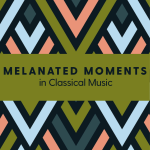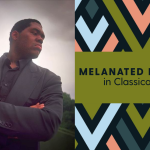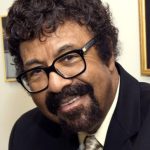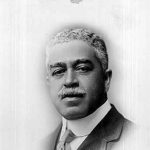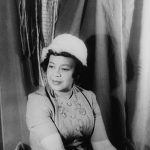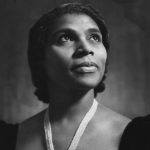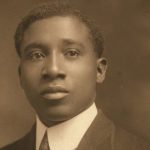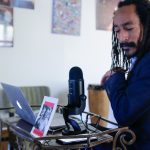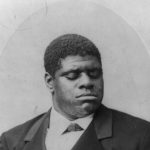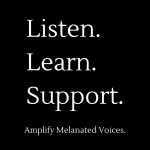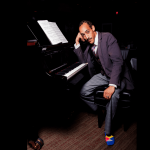Melanated Moments, S2E1: You Have the Right to Remain Silent – A Journey to Catharsis
Angela and Joshua speak with Pulitzer Prize-winning composer Anthony Davis and groundbreaking clarinetist Anthony McGill about the recent performance of “You Have the Right to Remain Silent” and the catharsis of sharing painful yet powerful experiences through music.
Featured Music:
“You Have the Right to Remain Silent,” by Anthony Davis, performed by clarinetist Anthony McGill and the Cincinnati Symphony Orchestra
Music Plays (00:05): [MMCM Theme] Joshua Thompson (00:15): Hello everyone. I’m Joshua Thompson Angela Brown (00:17): And I’m Angela Brown. And this is Melanated Moments in Classical Music. Joshua Thompson (00:23): You know, Angela, I’m not exactly sure what excites me most: actually having a second season of this podcast or the subjects and the guests that we have lined up this time around. Angela Brown (00:35): Honey, it’s all exciting to me! And I understand today’s episode is nothing short of historic. Joshua Thompson (00:40): You know, it really is because we’ve got two wildly impactful and influential people within and outside of classical music with us today, um, to speak on a new piece of music that is, I would say, as sonically spellbinding, as it is socially necessary. Angela Brown (01:01): Now you’ve got us all on the edge of our seats. So who and what are we talking about today? Joshua Thompson (01:08): Well, you know, today we are absolutely honored to welcome composer and the 2020 Pulitzer prize winner in music, Anthony Davis, and an equally trailblazing musician who recently worked with Mr. Davis, Anthony McGill. He’s a clarinetist educator and the very first African-American principal player of the New York Philharmonic since its inception in 1928. So when I told you that we got some heavy hitters for Season Two, baby, please believe me. Angela Brown (01:39): Honey, you weren’t lyin’, Joshua. There’s so much we could cover with both these gentlemen. So could you give us a little biographical rundown on each before we get into today’s musical selections? Joshua Thompson (01:52): Absolutely. And I’m only going to hit like two or three fun facts because there’s so much to discuss and guess what? That’s why they here. They can fill in the gaps where I might leave some of them out. So, as I said earlier, the winner of the 2020 Pulitzer prize in music is Anthony Davis. He was born in 1951 and as an American pianist and composer, he’s become one of my favorites. And he’s gotten so much a claim because he incorporates so many styles, whether it be jazz, rhythm and blues, gospel, non Western, African, European, and what we consider experimental music. He’s currently a professor at the University of California in San Diego, and he’s become the Dean of African American operas and we will find out why. So that’s a little bit on Anthony Davis. Anthony McGill was born in 1979 and he is quickly becoming one of the most brilliant and sought after clarinetists of his time. He’s been featured in the New York Times and appears regularly as a soloist with the top orchestras around North America. He’s been at the Lincoln Center and performs with the Philadelphia Chamber Music Society. All of that in addition to being the first black principal player of the New York Philharmonic. Angela Brown (03:14): Stunning. And what an honor to have you both here with us today, Mr. Davis, Mr. McGill, welcome to Melanated Moments in Classical Music. Anthony Davis (03:24): Thank you so much. Anthony McGill (03:25): Thank you so much, yeah. Joshua Thompson (03:27): Absolutely love this. Uh, when we found out that both of you were interested and eager, we were like, “Drop everything, let’s do it, let’s do it.” So there’s so much to cover and we’re going to get a lot of it. Like there’s litanies of operas and compositions and performances, but Angela and I wanted to talk about a recent project that you all did. I believe it was in October of 2020 with the Cincinnati orchestra, “You Have the Right to Remain Silent.” Mr. Davis, it’s your piece. So can you tell us the origin story for this work and how you came to partner with Mr. McGill on this modern masterpiece? Anthony Davis (04:03): Thank you. Thank you. Thank you very much. The piece came to be, I was working on a commission by uh Miller Theater to do a new composition. I originally wrote it for my friend, J.D. Parran who played in my group, et cetera. And I’ve been writing a lot of opera, but I hadn’t written a lot of, at that time, written a lot of chamber music. So I thought, I mean, I’d like to do a clarinet concerto, but where the clarinetist is in the position of being interrogated by the ensemble. Angela Brown (04:29): So if I’m not mistaken, you like many others have some personal experience being interrogated. Anthony Davis (04:37): Well, definitely I had, I had a couple experiences like that. One was in Connecticut. I was driving to Boston to do a concert with, with Anthony Braxton. I was stopped by the police and actually I was on the side of the road for over an hour until they had called a backup. And my wife at the time said, you know, don’t, you know, cause I was, I was wondering, “Why, why am I stopped here? What’s going on?” As she says, the guy has a gun drawn. Angela Brown (05:04): Oh my goodness! Joshua Thompson (05:04): Oh wow. Just stops you in your tracks. Anthony Davis (05:06): Yeah, well it turned out someone meeting my description have robbed the bank in Hartford. And the piece, it’s not a strict realization of what happened. It’s just an example of what happens to Black men and, and their relationship to the police. Joshua Thompson (05:22): So, so this piece definitely draws on conflicts and almost confrontations you’ve experienced personally. And it’s probably all too familiar for a lot of Black people in this country. That’s something we’re going to get to in a little bit with Mr. McGill. But right now, we’re going to let the audience hear, what we’re talking about. So I’d love for you to give us an overview of this journey that we’re going to take the listener on in the terms and how you’ve actually composed it and structured it. Anthony Davis (05:54): In terms of the structure that first movement is “Interrogation.” So I thought about the interrogation of the clarinet, that first moment of vulnerability, that I experienced, Anthony’s experienced, so many people have experienced. And then the second movement, “The Sense of Loss,” you know, the, the emotional response to it, culminating in the theme at the end of that moment. And then the third moment is “Incarceration.” And that thinking about the rhythm of the language, et cetera, of the, of the Miranda Declaration with percussion rhythms and the clarinet and the kurzweil interact with these kind of punctuations that are coming from the fragmentation of the Miranda Declaration, then the last movement, “Dance of the Other,” is kind of the cathartic release, you know, finally, almost drawing upon that kind of an African minimalist kind of thing. And this feeling of finally in this case, being able to come home. Angela Brown (06:51): All right then. Well, I think it’s about time we listen. Here’s the second movement from “You Have the Right to Remain Silent,” performed by the Cincinnati Orchestra, featuring Mr. Anthony McGill on clarinet. Music Plays (07:05): [Anthony Davis, “You Have the Right to Remain Silent,” performed by the Cincinnati Orchestra, featuring Mr. Anthony McGill] Joshua Thompson (11:20): Oh man. So there is just so much going on in this movement from the metallic to the cosmic, and then you just bring it back in a, in a familiar, smooth, and jazzy way to finish it. It really is as familiar as it is chaotic. Angela Brown (11:39): Yeah. Mr. McGill, how did you approach this work as a soloist? Anthony McGill (11:44): Well, I think, you know, as a, as a performer, you know, I was really pushed to stretch outside of my boundaries, my capacity, like on, on the instrument, because what was interesting about this movement is that it’s written for an instrument that I’d never played before called the Contra Alto clarinet. The other movements on a B-flat clarinet, which is your standard clarinet. And this movement is on an interesting, huge instrument. It looks like a bass clarinet it’s, you know, this, this thing is like taller than me. Angela Brown (12:17): I thought you were handling that thing up there. It looked like you was handling a woman though. Anthony McGill (12:25): And then that instrument, it has a soul of its own, you know, because it’s so huge, you know, and it, it can make all kinds of sounds that you’ve never heard any instrument make so harmonically. And then the, the piece has the regular staff line and then has a black line through it saying, just do what you want basically. And it’s like, I’m used to, you know, having the notes in front of me, every single note in front of me. And they just kind of like, let me find myself in the music by kind of screaming and crying through my instrument. Joshua Thompson (12:56): Wow. I just think this is so amazing how you found yourself working with a completely new instrument, but it sounds like you were performing in a new way as well. Um, it just sounds like you had a really extraordinary opportunity to totally put all of yourself into this piece. Anthony McGill (13:15): Yeah. I mean, this was, first of all, it was such an honor to be asked to do it. So I said yes to right away. And I related to the piece in a very personal way, like I do with a lot of pieces. My one not so positive encounter with the police happening in Cincinnati, when I was in the orchestra there about 20 years ago, my first orchestra job in Cincinnati, Ohio. And one night I was in Northern Kentucky because, if you know the area, it’s right across the Ohio river, I was driving a group of friends home from a restaurant really late. And I got pulled over by a guy and, you know, he flashed the light in my face. And fortunately I had people in the car with me because he looked at me and he said something like, “You know, why I pulled you over?” And I was like, “No.” He’s like, “This ain’t California, boy.” And he just said “boy” in such a way that I immediately felt like I was in the deep South. All of it felt like I was, I was stripped down and I, I felt like the next thing that can happen will be, be on, somewhere that I don’t want to be. And, and it, it was just one of those things where it was like a terrible experience. Let’s just put it like that. And, you know, going back to, to do it in Cincinnati was going to be such a powerful thing for me. But after the events of last year and the last summer with George Floyd, murder of George Floyd, and, and others, many others over time, over the, since I’ve been alive, all these experiences kind of like coming to a point of complete exhaustion and frustration paired with the pandemic. This came along to me like a real gift. Angela Brown (14:59): Oh. So it sounds like this piece meant a lot to you. Anthony McGill (15:02): Yeah. It meant a lot to me to like pour myself into experiencing this piece as a soloist, but also as a character in the piece. Joshua Thompson (15:12): Yeah. I love that because you like so many of us after the year that was 2020, we’ve all been in need of some kind of catharsis. So, I’m really interested to know what are the things that you were feeling, or that were going through your head as you were performing the piece? Anthony McGill (15:32): Oh yeah. I love that. I think the word you use for cathartic is, is what it feels like. When you play music, the feelings that you get from it, that’s why I play it. That’s why I’m a musician is because of really how it makes you feel, what kind of journey it takes you on. And so, yeah, the pieces can be painful too, you know, they can be painful to play because you’re feeling the energy of that work, but that experience of that dealing with such pain and loss, but there’s also redemption there’s hope in this piece, there’s beauty and you’re in those moments, that is the cathartic part. That is the part that heals you, that is healing to play and to be able to express those kinds of painful emotions. Joshua Thompson (16:15): Yeah, absolutely. That, that musical South, if you will. Anthony McGill (16:19): Yeah. Joshua Thompson (16:20): Okay. So getting back into the piece, we’re going to go through and do a little dissecting and digesting, but in no particular order, um, and after hearing you describe how you put your experiences into the performance, Mr. McGill, we’ll start with a section from what we heard that really reflects a lot of what you just described. Music Plays (16:41): [Anthony Davis, “You Have the Right to Remain Silent,” performed by the Cincinnati Orchestra, featuring Mr. Anthony McGill] Anthony McGill (16:50): One thing that’s going on here. A lot of the sounds of pain and everything that I’m playing on the contra Alto, Earl is spicing them through his instrument. While he’s producing and playing the keys with similar sounds and creating new ones based on the sounds that I’m also making. So it’s a really interesting form of like a chamber music where, but my instrument is actually going into his instrument and he is processing that out. So what you’re hearing is the Kurzweil and the Contra Alto as a new instrument. Joshua Thompson (17:28): It’s just so fascinating to me. And I love how it resonates with your journey as the character you’re portraying, but it’s, it’s really us, it’s you as a person in real life, there are things that are, that are going on in your head or that you might be saying during this process that are normal, but juxtaposed against this context of an interrogation, and this interrogation is unbelievably jarring. It’s unsettling. I almost want to say alien, but unfortunately for, for those of us who occupy this skin, maybe not that alien. And I just, I love how you’re able to capture that. So jumping back to the part that leads into it, I’d love to hear Mr. Davis give us some, some insight into exactly what is going on. Anthony Davis (18:13): Yeah. So just before that, in the instrumental music, I had this, crossfade where you have these different rhythms patterns against each other. So there’s that kind of acceleration that’s happening in the music. And it builds to a peak, right at the peak, it’s like the abyss, it just falls out. I love that silence because I silence, it’s like, you know, where are we? You know, what happened? The unanswered question thing or, or the abyss or whatever. Joshua Thompson (18:51): I absolutely love that. And I think this is why silence in music, or just in general is wildly underrated. That silence that gives us the time to even attempt to answer the questions that you’re posing to the listeners. So, absolutely brilliant. Moving towards the end of this piece, there’s some really interesting melodic things and some multi-physics sounds of the Contra Alto clarinet that we’re listening to. Mr. McGill, can you give us a little bit more information or understanding about what, what goes into this, this final part in this movement? Anthony McGill (19:28): You know, it’s interesting here. I, I was living in two characters, two worlds. One of the worlds is that world, as you hear, which is the multi-phonic world that is kind of like the alien world or that a dangerous world, the dark side, if you will. And the other one is the more, um, normal bluesy or jazzy or normal world where you’re just kind of getting along. You’re kind of like existing, but it’s like it’s multilayered. And so, especially when the Kurzweil comes in, it samples out in the distance. It’s almost like they’re, it’s, multi-dimensional, you know, like they’re different, these different layers of life, too, that happened. Anthony Davis (20:17): It’s interesting, he talks about the two worlds, I’m fascinated with that because then the regular pitch world comes in too. It’s a beautiful, you know, contrast of things, you know, those kinds of contrasts I’m interested, was interested in the entire piece. It comes out in a… Microcosm in those moments of the improvisation. Joshua Thompson (20:40): This is just amazing. I think I appreciate this part of the piece so much because musically, it sounds a little bit more, I don’t know, normal to, or familiar what we’re used to hearing, but oh my goodness. It’s so smooth and it is smothered in some Duke Ellington and it’s just a wonderful way to kind of reel us back in from orbit, I think, but it’s just a wonderful way of bringing us back. Anthony Davis (21:05): It’s pretty funny when you’re composing something like that. Sometimes it’s like, you’re communing with spirits and it’s not, you don’t, it’s not just you in there, you know… Like it’s Ellington, he’s always been, you know, one of my role models and you know, I met him when I was, uh, I guess I was 18 years old, obviously a student and, and uh, those days I had a huge Afro I had like an Angela Davis Afro. Angela Brown (21:29): That’s wonderful! Anthony Davis (21:29): But I was shy! I was in the corner of the room, and Ellington walks in the room, looks across the room and sees this guy with a huge Afro, which is me, he pointed at me and said, “Oh, oh God, you must be a musician.” He made me come over there, so I came over there and I got to talk to Ellington for the evening. Anthony McGill (22:03): No way! Angela Brown (22:03): Wow! It feels so powerful that we can hear echoes of our past in this modern work. Mr. McGill, did you feel a tie to any of the lineage as you performed this piece? Anthony McGill (22:15): Yeah. That, that line, that lineage is something that’s very real and you can it’s, you can feel it, you can almost touch it because none of us, especially as Black musicians, would be here if we weren’t standing on those people’s shoulders, that we weren’t a part of this line of artists and Black musicians that have fought through things that, you know, I only think are unimaginable, right, but that we know are very real and still exist. And so that line, that lineage, that heritage of great American Black musicians and creators is something that’s very powerful to kind of connect with. And so when I’m playing a piece like this, I’m being connected through Anthony Davis, through his experiences, and coming through me, and through the experiences of all those people, he just mentioned too that came through him. And then I get, uh, you know, the gift of being able to, to kind of be a conduit for that lineage, that line of great American artists is something that’s really powerful that comes through. Joshua Thompson (23:26): Absolutely. I’m thinking as we wrap up this conversation after talking about, you know, our lineage in this piece, it leaves me and I’m sure a lot of other people wanting to know what’s next, you know, how do we program post 2020? What’s the function of music in the broader context moving forward? Anthony McGill (23:47): Well, I think being able to connect in the way that you can connect with composers that are of today, that composers that are are of similar backgrounds from you, the composers that are different from you. I mean, music connects everybody. And so to be able to like commune in that place and be there is healing and this piece that gives me a sense of connection. And it gives me that sense of greater purpose. Anthony Davis (24:16): Yeah. Well, I felt that when he was playing and he played, I mean, sometimes you, you know, create a piece of music that creates a journey for the performer as well as, as also a journey within the listener experiences too. I mean, that’s how I, I approach opera to this things, the idea of, you know, how a character transforms over time or comes to a point of realization and that the audience can identify with that journey that the character takes. Joshua Thompson (24:45): Well, we’ve gone on journeys in cathartic improvisation journeys toward a better understanding of ourselves. And more importantly, those around us, this piece has it all. And I would like to sincerely thank Mr. Davis and Mr. McGill for sharing your time, your thoughts, your energies, and your gifts with us today. So with that being said, I’m Joshua Thompson. Angela Brown (25:10): And I’m Angela Brown. Unison (25:12): And this has been Melanated Moments in Classical Music. Joshua Thompson (25:16): Season two of melanated moments in classical music was made possible by the Central Indiana Community Foundation. We thank them for their support. Angela Brown (25:30): Melanated moments in Classical Music is proud to partner with the Coalition for African-Americans in the Performing Arts and Morning Brown Incorporated. Joshua Thompson (25:42): Melanated Moments in Classical Music is a production of Classical Music Indy. Our producer is Ezra Bakker Trupiano. Our theme music was composed by Laura Karpman.
[/su_tab] [su_tab title=”Related Blog Posts” disabled=”no” anchor=”” url=”” target=”blank” class=””]LOCAL CLASSICAL – MELANATED MOMENTS SEASON SIX
As we continue celebrating Black Music Month, this week’s playlist will feature music and artists discussed during the latest season of Melanated Moments in Classical Music. All of season six was recently released and featured vibrant discussions about artists such as Scott Joplin, Hazel Scott, Joseph Bologne, and Kenneth Overton, among others.
LOCAL CLASSICAL – BLACK MUSIC MONTH
In this week’s playlist, we celebrate Black Music Month which takes place in June. It was created by President Jimmy Carter in 1979 to honor and celebrate Black artists’ contributions to music. We’ll be honoring the late Herman Whitfield III, an Indianapolis native who was a gifted pianist and composer. We’ll also hear performances of artists who have been featured in season four of Classical Music Indy’s podcast, Melanated Moments in Classical Music.
LOCAL CLASSICAL – MELANATED MOMENTS
In this week’s Black History Month playlist, we bring you recordings by composers, performers, and artists who have been highlighted in our podcast, Melanated Moments in Classical Music. Melanated Moments is the ward-winning podcast from Classical Music Indy that shines a spotlight on musical works composed by, for, and about Black people.
LOCAL CLASSICAL – HOST OKARA IMANI
Hey, Starshine! This is Okara Imani, Media Production Fellow for Classical Music Indy, and your guide to The “I” in Classical Music. I’m here to highlight the cultural and social intersections of the classical art form, beyond the Classical Period and beyond the constructs of Euro-centric high society origins.
Ric’key Pageot: Inspiring a Moment to Learn, Acknowledge, and Respect
Ric’key Pageot: Inspiring a Mo …
Ignatius Sancho: Composing the Hypocrisy of Colonialism & Convention
Ignatius Sancho: Composing the …
NEW CLASSICAL – DR. BILL BANFIELD
This week we bring you the music of Dr. Bill Banfield. Dr. Banfield is an award-winning composer whose symphonies, operas, chamber works have been performed and recorded by major symphonies across the country. Few have a wider, performed professional composing output, that has had public concert performances, reviews, radio, recordings of some 12 symphonies, 7 opera, 9 concerti, chamber, jazz, and popular forms. This alone making Dr. Banfield one of the most performed, recorded composers of his generation. In 2010 and 2016, Dr. Banfield served as a Pulitzer Prize judge in American music.
#AmplifyMelanatedVoices
Classical Music Indy stands with our Black community. We are here to listen, learn, and lend our support. We believe that classical music is powerful; that it evokes a range of human emotions and creative expression.
Angela Brown Brings her Unbridled Zeal to a New Podcast.
Angela Brown brings her unbrid …



